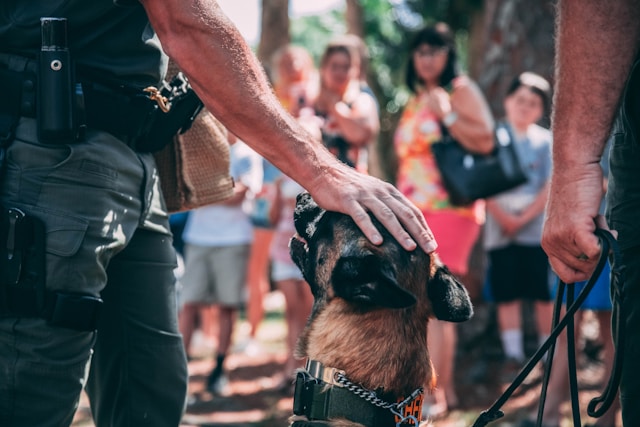Rescue Dogs: Unsung Heroes Saving Lives and Changing Futures

Rescue dogs are more than just loyal companions—they are brave, intelligent, and indispensable heroes who perform extraordinary feats. From searching for survivors in disaster zones to providing emotional support, these remarkable animals play crucial roles in various fields. This blog delves into the world of rescue dogs, highlighting their heroic contributions, the challenges they face, and the profound impact they have on individuals and communities.
1. The Role of Rescue Dogs
Rescue dogs are specially trained to assist in a variety of life-saving tasks. Their skills and dedication make them invaluable assets in emergency situations and daily support.
1.1. Search and Rescue
- Disaster Response: Rescue dogs are essential in disaster response, including earthquakes, floods, and landslides. Their keen sense of smell and tracking abilities enable them to locate trapped or missing individuals amidst rubble and debris.
- Urban Search and Rescue: In urban environments, rescue dogs help locate victims of building collapses and other accidents. Their ability to navigate complex structures and detect human scent through obstacles makes them crucial for these operations.
1.2. Detection Work
- Explosives Detection: Some rescue dogs are trained to detect explosives, helping to ensure public safety in areas prone to bomb threats or terrorist attacks. Their training involves recognizing the scent of various explosive materials.
- Narcotics Detection: Dogs trained in narcotics detection assist law enforcement agencies in identifying illegal drugs. Their remarkable sense of smell allows them to locate hidden substances in various settings.
1.3. Emotional Support
- Therapy Dogs: Rescue dogs are often used as therapy animals to provide comfort and emotional support to individuals facing trauma, stress, or mental health challenges. Their presence can offer solace and improve overall well-being.
- Assistance Dogs: Some rescue dogs are trained to assist individuals with disabilities, such as guiding the visually impaired or providing mobility support. Their training enables them to perform specific tasks that enhance the quality of life for their owners.
2. Training and Preparation
The journey to becoming a rescue dog involves rigorous training and preparation, ensuring that these animals are equipped to handle their vital roles.
2.1. Basic Training
- Obedience Training: Rescue dogs undergo basic obedience training to ensure they respond reliably to commands and instructions. This foundational training is crucial for effective performance in rescue operations.
- Socialization: Socialization with different environments, people, and other animals helps rescue dogs adapt to various situations and remain focused on their tasks.
2.2. Specialized Training
- Search Techniques: Dogs trained for search and rescue learn specific techniques for locating individuals, such as scent tracking, air-scenting, and rubble searching. They practice these skills in simulated disaster scenarios to prepare for real-life situations.
- Detection Skills: For detection work, dogs are trained to identify and alert to specific scents associated with explosives, narcotics, or other substances. This training involves positive reinforcement and extensive practice to ensure accuracy.
2.3. Ongoing Evaluation
- Regular Assessments: Rescue dogs undergo regular evaluations to assess their skills, health, and readiness for deployment. These assessments help maintain their proficiency and ensure they are prepared for various scenarios.
- Continuous Training: Ongoing training and practice sessions help rescue dogs stay sharp and adapt to new techniques or challenges they may encounter during their work.
3. Heroic Stories: Notable Rescue Dogs
Rescue dogs have been involved in numerous high-profile and inspiring rescue missions. Their stories highlight their bravery, dedication, and the profound impact they have on people’s lives.
3.1. Search and Rescue: 9/11 Heroes
- Story: During the aftermath of the September 11, 2001, attacks, numerous rescue dogs and their handlers worked tirelessly at Ground Zero to search for survivors and recover victims. Dogs like Bretagne, a Golden Retriever, became symbols of hope and resilience.
- Impact: These dogs played a crucial role in the recovery efforts, providing comfort and assistance in one of the most challenging disaster response scenarios in history.
3.2. Detection Work: The Case of K9 Kira
- Story: K9 Kira, a Belgian Malinois, gained recognition for her work in detecting explosives during high-profile events. Her keen nose helped prevent potential threats and ensure the safety of countless individuals.
- Impact: Kira’s contributions highlight the essential role of detection dogs in safeguarding public events and maintaining security.
3.3. Therapy and Assistance: The Story of Max
- Story: Max, a rescue dog with a background of abuse, was rehabilitated and trained as a therapy dog. He provided comfort to children in hospitals and individuals facing trauma, demonstrating the transformative power of therapy animals.
- Impact: Max’s story showcases how rescue dogs can overcome their pasts and become heroes in their own right, offering emotional support and healing to those in need.
4. The Challenges Faced by Rescue Dogs
While rescue dogs perform incredible feats, they face various challenges that require support and attention.
4.1. Physical and Mental Strain
- Physical Demands: Rescue work can be physically demanding, requiring dogs to navigate challenging terrain, work in extreme conditions, and perform strenuous tasks. Ensuring their health and well-being is a top priority.
- Mental Stress: The nature of rescue work can be mentally taxing, as dogs encounter distressing situations and work under high-pressure conditions. Providing mental stimulation and support is essential to maintain their overall well-being.
4.2. Health and Safety
- Injury Risks: Rescue dogs may be exposed to hazards such as debris, toxic substances, or extreme weather. Proper protective gear and medical care are necessary to address any injuries or health issues.
- Regular Check-Ups: Routine veterinary check-ups and health screenings help monitor and maintain the health of rescue dogs, ensuring they are fit for their demanding roles.
5. The Impact of Rescue Dogs on Communities
The contributions of rescue dogs extend beyond their immediate work—they have a profound and lasting impact on communities and individuals.
5.1. Raising Awareness
- Public Engagement: The work of rescue dogs often garners public attention and raises awareness about their roles and contributions. Media coverage and community events highlight their achievements and inspire others to support rescue efforts.
- Advocacy: Stories of rescue dogs can lead to increased advocacy for animal welfare, supporting initiatives such as training programs, funding, and support for rescue organizations.
5.2. Building Trust and Support
- Community Relations: Rescue dogs help build trust and foster positive relationships between communities and emergency services. Their presence can enhance collaboration and support during times of crisis.
- Emotional Healing: By providing comfort and assistance, rescue dogs play a role in emotional healing and recovery for individuals affected by trauma or loss. Their impact is felt long after the immediate crisis has passed.
6. How You Can Support Rescue Dogs
Supporting rescue dogs and their work involves various actions that contribute to their well-being and success.
6.1. Volunteering
- Support Organizations: Volunteer with organizations that train and deploy rescue dogs. Your time and skills can help with training, fundraising, and community outreach.
- Foster Programs: Consider participating in foster programs for rescue dogs, providing temporary homes and care while they undergo training or await adoption.
6.2. Donations
- Financial Support: Donate to rescue organizations and programs that support the training and deployment of rescue dogs. Your contributions help cover expenses such as training, equipment, and veterinary care.
- In-Kind Contributions: Provide in-kind donations such as dog food, equipment, or supplies to organizations that support rescue dogs.
6.3. Advocacy and Awareness
- Spread the Word: Share stories and information about rescue dogs to raise awareness and support for their work. Use social media, community events, and educational initiatives to highlight their contributions.
- Support Legislation: Advocate for policies and legislation that support animal welfare and the training of rescue dogs. Your voice can contribute to positive changes and improvements in the field.
Conclusion
Rescue dogs are truly unsung heroes, embodying bravery, intelligence, and unwavering dedication. Their roles in search and rescue, detection work, and emotional support highlight their extraordinary contributions to society.
By understanding and supporting the work of rescue dogs, we can appreciate the profound impact they have on saving lives, providing comfort, and building stronger communities. Their stories inspire us to recognize and honor these remarkable animals, ensuring they receive the respect, care, and support they deserve.
As we celebrate the achievements of rescue dogs and their handlers, let us continue to advocate for their well-being and contribute to their success. The legacy of rescue dogs is a testament to the incredible bond between humans and their canine companions, and their heroism will forever be remembered and cherished.




